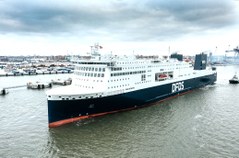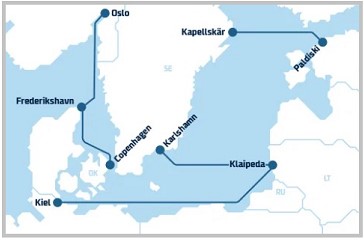- Captain Sergej Sved
-
steers the ship and leads the crew on the Aura Seaways (above holding the binoculars). Next to the Captain is able seaman Igor Kuzmiciov.
- Aura and Luna Seaways
-
Began sailing the Karlshamn-Klaipeda route in 2022 in order to increase capacity on the crossing, where the shipping company has experienced constant growth in goods and passenger transport since 1993.
The ships sail under Danish flag with nearly all-Lithuanian crews. This is because they dock in a Lithuanian port and Lithuanian labour is highly qualified, explains Anders Refsgaard, Head of the Baltic Region for the past ten years.

Photo: HenSti, Wikipedia
- Ferry crossings in the shadow of war
-

The war in Ukraine is having a clear impact on life onboard the Aura Seaways and her sister ship. Since war broke out, passenger volumes on the Karlshamn-Klaipeda crossing have fallen by around 20 per cent, says Anders Refsgaard, DFDS Vice President and Head of the Baltic Region for the past ten years.

Anders Refsgaard, DFDS' Head of the Baltic Region
“The war affects us quite a lot as a shipping company. Until 2022 we only saw growth, but this has changed because of the war, higher energy prices, inflation and sanctions against Russia.”
The Baltic Sea and the Baltic countries are busy transit routes for the transport of goods between the Nordics and Western Europe to the region east of the Baltics – including Ukraine and Russia. But the war and sanctions against Russia mean cooperation is severely reduced. DFDS stopped all activity in and with Russia when the war started.
Anders Refsgaard expects the return of growth to the Baltic crossings when the war in Ukraine ends.
“Much of the goods transport on the route consists of building materials, and we expect a large increase in that when the war finally ends, and Ukraine needs rebuilding.”
The war has an impact on the shipping companies’ employees too, he says Anders
“Nearly all our employees on the Karlshamn-Klaipeda crossing are Lithuanian, but the shipping company also employs quite a few Ukrainians and Russians. There is good cooperation between all nationalities, but the war in Ukraine is not something that people talk about at work. It is a private matter.”
 Follow us on Facebook
Follow us on Facebook
